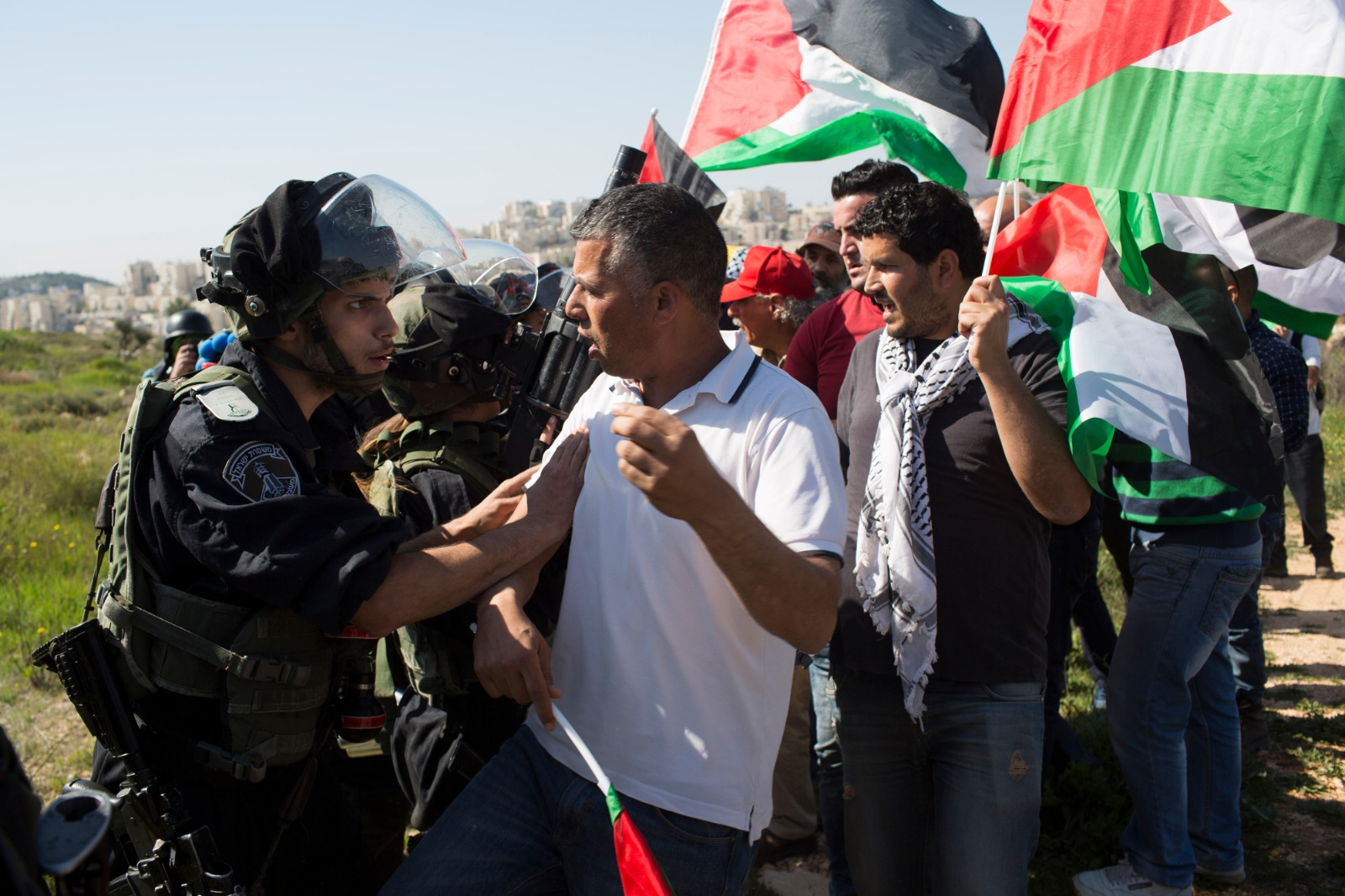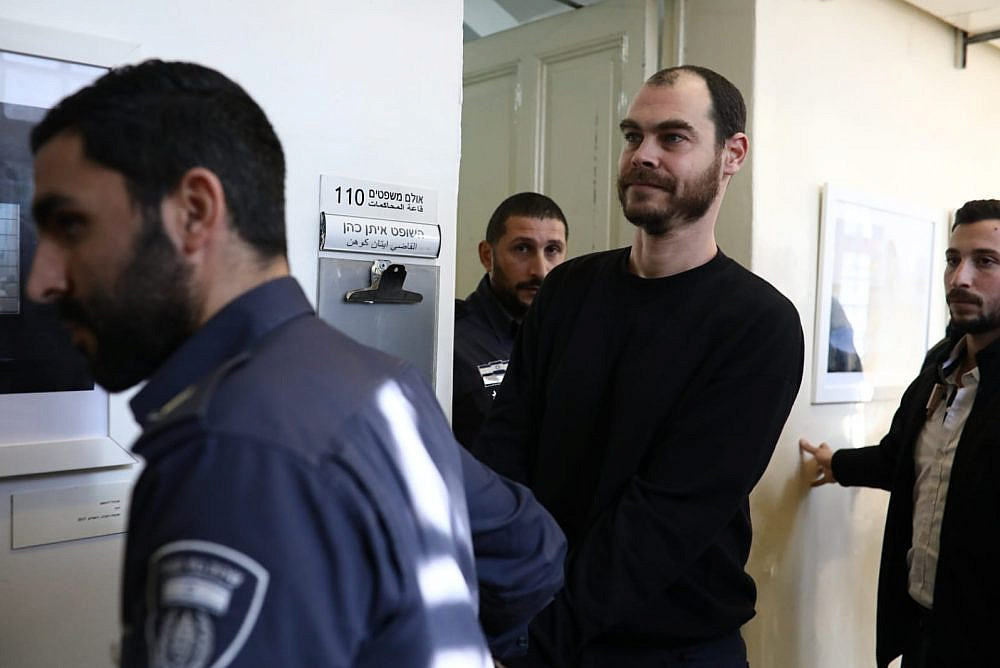I was standing in the fields of the West Bank village of Bil’in 15 years ago when my phone rang from an Israeli number. On the line, someone was speaking in a mix of broken Arabic and Hebrew. At the time the Israeli military had just begun targeting Bil’in to build the apartheid wall, and while the bulldozers had started working in the nearby village of Budrus, activists were showing up at our village too.
Among the first people to come to Bil’in was the person on the phone. I’ll admit, at first I found him odd, even a bit freakish: he looked like a punk teenager, wearing strange clothes and with a wild haircut dyed with different colors. Full of energy and spirit, he walked up to us and got right down to business.
“We are a group of anarchists against the wall,” he said, “and we want to support you in your struggle.”
I looked at this strange visitor from Tel Aviv, my mind at once grappling with the contradictions and the respect I felt. Who is this boy thinking he can stop the wall? He is part of the occupation! Why is he really here? From that first encounter, however, it was clear that he was passionate and willing to work tirelessly. He communicated with the people around him so easily and quickly that it didn’t take long before he earned my trust.
That’s how I came to know my friend Jonathan Pollak – who is now sitting in Israeli detention because of a right-wing organization’s lawsuit targeting his activism in Palestinian villages like mine.
Jonathan has played a prominent role not only in Bil’in but in many other villages across Palestine. Every young person who has participated in West Bank demonstrations against Israel’s colonization knows him as Jonathan, the human rights defender. Jonathan, who refuses to normalize the occupation. Jonathan, the animal rights defender. Jonathan, who refuses to be identified by his citizenship or religion, but as a free person.
On Feb. 13, 2015, I was arrested on false charges at one of our weekly demonstrations in Bil’in. The Israeli military claimed that I was participating in an illegal protest, preventing Border Police officers from carrying out their work and attacking them. The truth is that one of the officers attacked me with pepper spray for no reason, which is illegal under Israeli law; he lied and claimed that I had pushed him. He arrested me as a political punishment to cover up his own unlawful act.
I have been on trial for these charges since I was arrested four years ago. My lawyer and I provided the Israeli police and the military prosecutor with video evidence to prove that the arresting officer lied, but it was ignored up until now. On Sunday, after four years, I was finally acquitted and the charges against me were dropped.

This is not the first time that I have been arrested — and acquitted — on such false charges. Previously, Israeli soldiers accused me of throwing stones at them during one of our demonstrations while inciting others to do the same. In fact, I had been traveling abroad that same day. I was lucky — but my friends Abdallah and Adeeb were not. They were convicted and spent more than 16 months in prison for the same made-up charges.
My acquittal on Sunday was issued by an Israeli military court. This a rare privilege: according to Israeli human rights group B’Tselem, the rate of acquittals in the military court system is four out of every thousand. And though I was acquitted, I know that this system is inherently unjust and corrupt, built to keep us all as political prisoners. It is an oppressive regime designed solely for Palestinians: the judge is an Israeli military officer; the prosecutor is an Israeli soldier; even the translators and clerks are part of the Israeli army.
My friend Jonathan was arrested last week (and not for the first time) on charges similar to those I faced. Unlike me – and unlike Abdallah, Adeeb, and all Palestinians who are arrested for protesting – he will face judgement in an Israeli civil court, one which is supposed to protect the rights of citizens but in practice protects settlers, soldiers, and those who uphold apartheid and occupation. Because he supports our cause, I don’t expect him to find justice.
Due to of the nature of his arrest, and because he is not Palestinian, Jonathan could pay NIS 500 bail and walk out of jail. But he is a principled person. He has seen me and countless other Palestinian friends arrested on false charges, powerless to prove our innocence. So, he has decided to refuse bail and remain in detention instead. He won’t play by the rules of a system that is rigged against justice.
As I saw the photos of Jonathan’s arrest, I thought back to one of the demonstrations in Bil’in when an Israeli soldier shot a tear gas canister directly at the demonstrators. The canister hit Jonathan’s skull, causing damage that still affects him to this day. These canisters have killed many other protestors, including Bassem Abu Rahma from my village.
In the end, tear gas canisters, batons, and bullets do not differentiate between Jonathan’s head and that of a Palestinian demonstrator, even if the soldiers firing them do. And while there are profound differences between the military court in which Palestinians must stand trial and the civil court where Jonathan will face his, I join my friend in recognizing that both are part of the same unjust system.
Despite the many barriers that Israel has tried to place between us, we are part of the same struggle. Jonathan has stood alongside me and all Palestinians since he was a punk-looking teenager with weird clothes and crazy hair. Today, as a human rights defender and as a person of principle, I am proud to stand up and support Jonathan Pollak.

